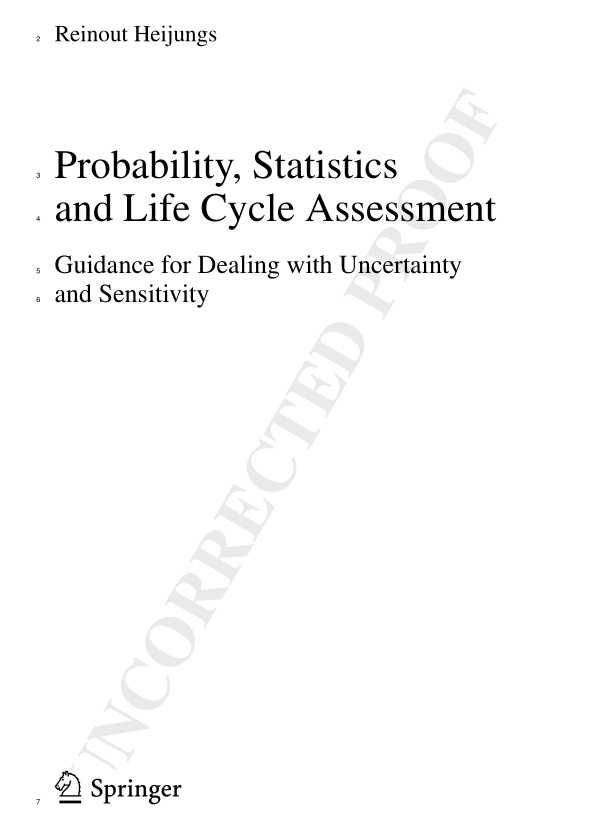Reinout Heijungs - Probability, Statistics and Life Cycle Assessment

In 2024, I will publish the book Probability, Statistics and Life Cycle Assessment - Guidance to Dealing with Uncertainty and Sensitivity, at Springer.
Full reference
R. Heijungs. Probability, Statistics and Life Cycle Assessment - Guidance to Dealing with Uncertainty and Sensitivity. Springer (ISBN 978-3-031-49316-4), in press, xxviii+1148 pp.
Short description (from the suggested back cover)
It is widely acknowledged that environmental life cycle assessment of products (LCA), including the product environmental footprint and the product carbon footprint, is a crucial method to quantify the sustainability of production and consumption. It is equally well acknowledged that the data and results are associated with uncertainties that need to be taken into account in the decision-making process.
The current practice in this respect is quite disappointing. Many published case studies (both company-internal reports and peer-reviewed scientific articles) end with a sentence that the results are subject to uncertainty, but they do not quantify this uncertainty, and neither do they discuss how a decision-maker should interpret the uncertain results. A smaller group of case studies attempts to quantify the uncertainties, often by using a "pedigree matrix" and a "Monte Carlo" analysis. This then yields partly overlapping "error bars" or "confidence intervals", and the decision-maker is supposed to work with that. Finally, some researchers perform a sensitivity analysis to study the robustness of the results, but typically this is restricted to only a few topics, such as transport distance and life time.
This practice is dissatisfying for several reasons. One reason is that during the past twenty-five years many more advanced approaches have been published, based on, for instance, standardized regression coefficients, Latin hypercube sampling, copula models
or Sobol’ indices. Interesting and useful these approaches may be, outside the circle of PhD-research these methods hardly take off, partly because the usual software for LCA does not support the data or algorithms that are needed to carry out these analyses. A
second reason is that the validity of the concepts that are actually used (besides pedigree matrix and Monte Carlo analysis we mention the lognormal distribution, confidence intervals and hypothesis tests) is doubtful or missing.
This book sets out three objectives:
- to present the basics of probability, statistics and LCA, including error analysis, uncertainty and sensitivity (a "primer");
- to critically analyze the current practice (a "critique");
- to propose guidelines for improved practice (a "guide").
The book presents these topics in a unified mathematical notation, and it contains an extensive bibliography for further study.
Downloads
Click here for the table of contents.
 To main page.
To main page.
